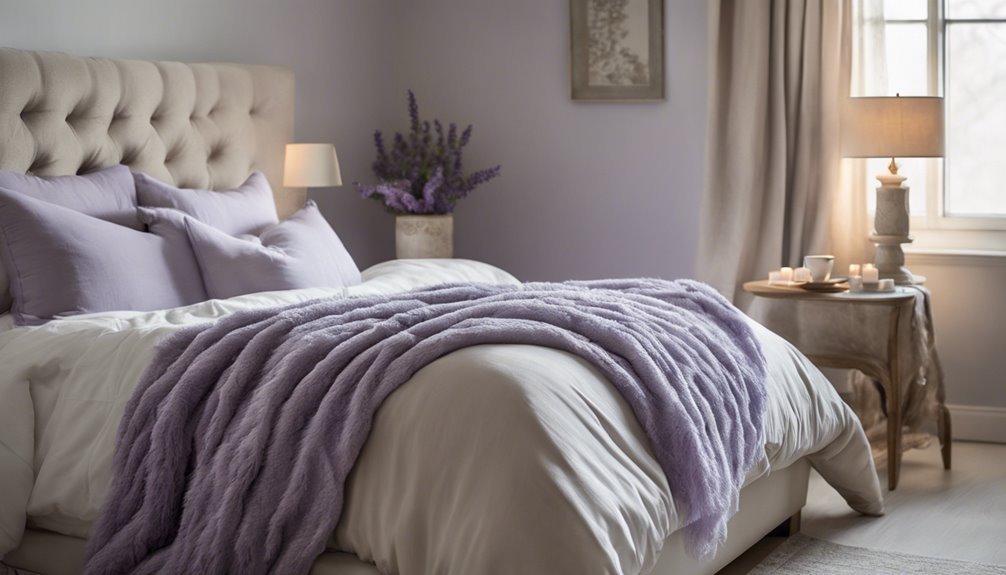Quick Tips for a More Restful Nights Sleep
Did you know that the light from your smartphone screen can significantly disrupt your sleep cycle? When you're winding down for the night, it's crucial to limit your exposure to blue light, as it can inhibit the production of melatonin, the hormone responsible for sleep. To ensure a more restful night, consider adjusting your evening habits and the environment of your bedroom. You might find that small changes, like swapping out your pillow or tweaking your nighttime routine, could lead to surprising improvements in sleep quality. Curious about which adjustments might be most effective for you? Let's explore some options together.
Key Takeaways
- Maintain a consistent sleep schedule, even on weekends, to stabilize your circadian rhythm.
- Create a calming bedtime ritual, such as reading or meditation, to signal sleep readiness.
- Optimize your sleep environment by keeping the room cool (60-67°F) and minimizing noise and light.
- Limit exposure to blue light from screens at least one hour before bedtime to enhance melatonin production.
- Incorporate relaxation techniques like deep breathing or guided imagery to reduce stress and promote relaxation.
Establish a Regular Sleep Schedule
Establishing a regular sleep schedule can significantly enhance your sleep quality and overall health. When you go to bed and wake up at the same time every day, your body's internal clock, or circadian rhythm, stabilizes. This consistency not only makes it easier to fall asleep but also improves the quality of your sleep.
You might wonder how rigid this schedule needs to be. Ideally, you should maintain the same bedtime and wake-up time every day, even on weekends. This regularity reinforces your body's sleep-wake cycle and can help you fall asleep more quickly and wake up more refreshed.
Incorporating bedtime rituals can also support your sleep schedule. These rituals signal to your brain that it's time to wind down and prepare for sleep.
While specific activities can vary based on personal preference, the key is to perform them consistently. This consistency further strengthens your body's association between these activities and sleep, making it easier to transition into a restful night.
Create a Relaxing Bedtime Routine
To enhance your evening ritual, consider creating a relaxing bedtime routine that signals your body it's time to wind down. This routine not only helps you transition from the day's stress into peaceful slumber but also deeply enriches your ability to serve others with renewed energy each day.
Here are four pivotal steps to crafting your nighttime routine:
- Set the Atmosphere with Aromatic Candles: Begin by dimming the lights and lighting aromatic candles. The soft, flickering light and soothing scents can help soothe your mind and create a tranquil environment conducive to relaxation.
- Incorporate Calming Music: Play gentle, calming music to further enhance the serene ambiance. This type of music can significantly lower your heart rate and relax your muscles, preparing your body for sleep.
- Practice Mindfulness or Meditation: Dedicate at least 10 minutes to mindfulness or meditation. This practice helps clear your mind of the day's worries and focuses your thoughts on the present, making it easier to let go and drift into sleep.
- Read a Book: Choose a light, enjoyable book to read for a few minutes. This can help by shifting your thoughts away from stressors and engaging your imagination in a calm, peaceful way.
These steps, woven into your nightly routine, can profoundly impact your sleep quality and your effectiveness in daily life.
Optimize Your Sleep Environment

After setting up a calming bedtime routine, it's equally important to ensure your sleeping environment supports restful slumber. Optimizing your sleep environment involves more than just aesthetics; it's about creating conditions that foster uninterrupted sleep. Here's how you can enhance your bedroom to promote better sleep:
Start by focusing on the ambient temperature of your room. The ideal temperature for sleep is generally between 60 to 67 degrees Fahrenheit. If it's too hot or too cold, your body struggles to reach a state of rest, making it harder for you to fall and stay asleep.
Noise reduction plays a critical role in minimizing sleep disturbances. Consider using white noise machines or earplugs to block out disruptive sounds. Alternatively, adding thick curtains or rugs can help absorb noise, creating a quieter environment.
Here's a quick guide to setting up your sleep environment:
| Aspect | Suggestion | Benefit |
|---|---|---|
| Ambient Temperature | Maintain 60-67°F | Optimal body relaxation |
| Noise Reduction | Use white noise machines | Minimizes sleep disruptions |
| Lighting | Use soft, warm light bulbs | Reduces eye strain and alertness |
Choose the Right Mattress and Pillow
Choosing the right mattress and pillow is crucial for enhancing your sleep quality. You're not just buying a bed; you're investing in your health and well-being. Here's what you need to consider:
1. Mattress Firmness: The ideal firmness depends on your sleeping position. Side sleepers generally need a softer mattress to allow their hips and shoulders to sink in slightly, reducing pressure points.
Back and stomach sleepers might benefit from a firmer surface that supports the spine's natural alignment.
2. Pillow Height: Your pillow should keep your neck aligned with your spine. Too high or too low can strain your neck muscles and hinder a good night's sleep.
Look for a pillow that matches the space between your neck and the mattress, which varies based on your sleeping position.
3. Material Quality: Invest in high-quality materials that enhance comfort and durability.
Memory foam, latex, and hybrid mattresses offer different benefits, such as contouring to your body, providing bounce, or offering better airflow.
4. Trial Periods and Warranties**: Many companies offer sleep trials** and extended warranties.
Take advantage of these offers to ensure the mattress and pillow meet your sleep needs without any risk.
Limit Exposure to Blue Light
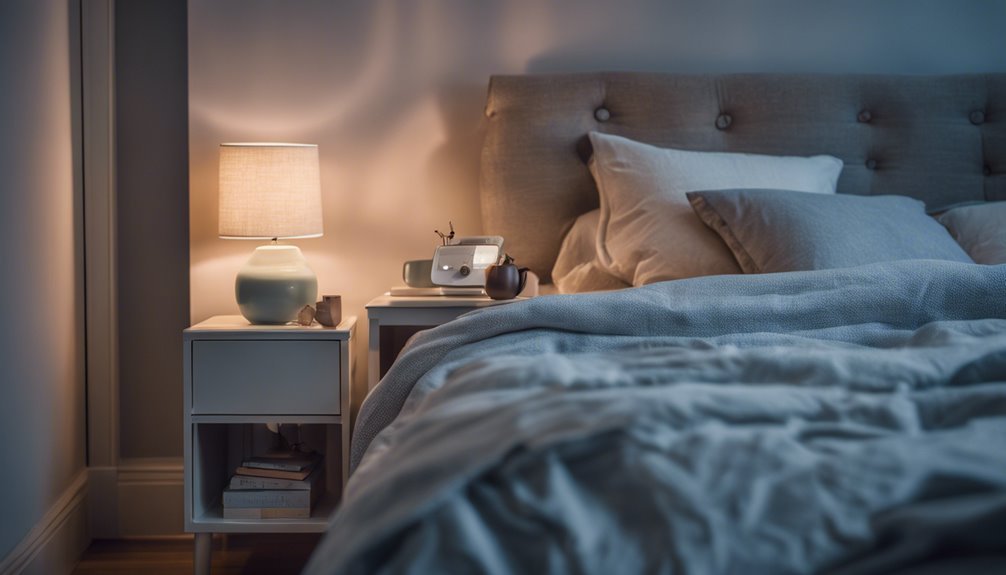
Limiting your exposure to blue light before bedtime can significantly improve your sleep quality. Blue light, predominantly emitted from screens such as smartphones, tablets, and computers, tricks your brain into thinking it's still daytime, disrupting the natural production of melatonin, the hormone responsible for your sleep-wake cycle.
To combat this, consider adopting blue light blockers. These are filters that can be installed on screens or glasses that you can wear, which effectively block or reduce blue light exposure. This small adjustment can lead to a substantial improvement in both the ease of falling asleep and the quality of sleep you achieve.
Additionally, practice effective screen time management. Set a strict schedule where you turn off all electronic devices at least an hour before bedtime. Instead, you can engage in relaxing activities, such as reading a book or meditating, which support your body's natural wind-down process.
Avoid Stimulants Before Bed
In addition to managing your exposure to blue light, it's equally important to avoid stimulants such as caffeine and nicotine close to bedtime.
If you're striving to serve others effectively, ensuring you get a proper night's sleep is crucial, and that means watching your intake of certain substances.
Let's break down why and how you can minimize these effects for a more restful night:
- Understand Timing: Caffeine consumption can affect your body for up to 6 hours after intake. Avoid coffee, tea, and other caffeinated beverages at least 6 hours before bedtime.
- Recognize Hidden Sources: Caffeine isn't just in coffee. It's also in chocolate, some pain relievers, and energy drinks. Read labels carefully to avoid inadvertently disrupting your sleep.
- Consider Nicotine's Impact: Nicotine effects are similar to caffeine, acting as a stimulant. Smoking or vaping before bed can severely impact your ability to fall and stay asleep.
- Create a Pre-Sleep Routine: Establish a calming routine that doesn't involve stimulants. Opt for herbal teas or a warm milk, which can help signal to your body that it's time to wind down.
Incorporate Physical Activity Daily
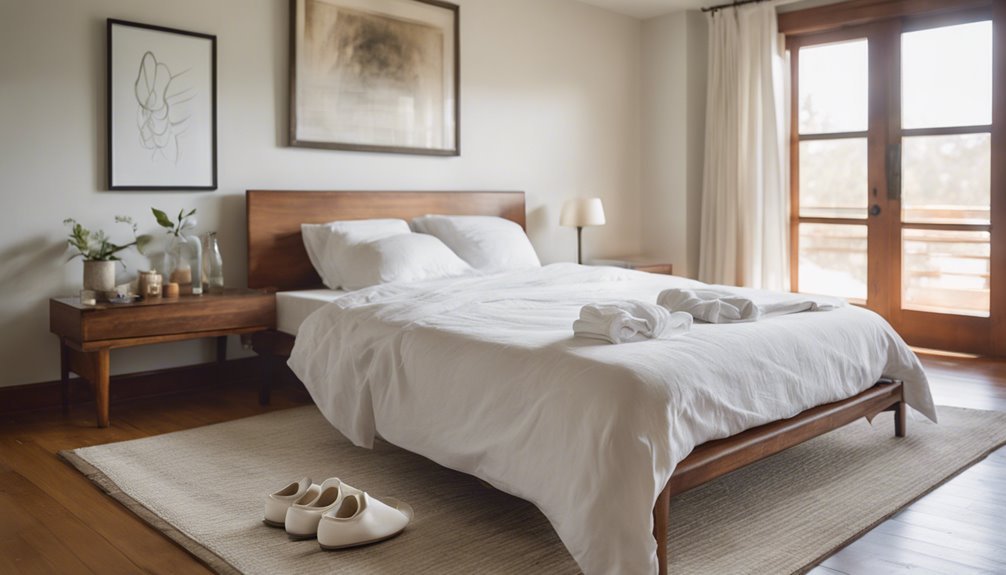
Regular physical activity boosts your overall health and significantly enhances your sleep quality. When you engage in daily exercise, you're not just sculpting a stronger body, you're also paving the way for better night-time rest. The key is to time your activities well to maximize their sleep-promoting effects.
Starting your day with morning workouts can be especially beneficial. These sessions kick-start your metabolism, brighten your mood by releasing endorphins, and, crucially, align your body's natural clock toward a healthier sleep-wake cycle. By exposing yourself to natural light during outdoor activities in the morning, you help regulate your body's production of melatonin, the hormone responsible for sleep.
Aim to incorporate at least 30 minutes of moderate exercise into your daily routine. This doesn't necessarily mean hitting the gym; a brisk walk or a cycle through the park counts too.
These forms of outdoor activities not only invigorate you but also ensure you're sufficiently tired by bedtime, promoting deeper sleep.
Manage Stress Effectively
As your day unfolds, managing stress becomes crucial for ensuring a restful night's sleep. It's essential to approach stress management proactively, integrating strategies that not only alleviate stress but also enhance your overall well-being.
Here's how you can effectively manage stress and embrace tranquility:
- Establish a Relaxation Routine: Dedicate time each evening to unwind. This might involve reading, practicing yoga, or engaging in deep-breathing exercises. Establishing a nightly ritual signals to your body that it's time to slow down and prepare for sleep.
- Incorporate Mindfulness Practices: Mindfulness can significantly reduce stress levels. Try meditating for a few minutes each day or simply practice being present during routine activities. This helps calm the mind and body, making it easier to fall asleep.
- Set Realistic Goals: Overloading your schedule can heighten stress. It's important to set achievable goals each day and recognize the value in what you've accomplished, rather than worrying about what you haven't.
- Communicate Openly: Don't bottle up your feelings. Sharing your thoughts and concerns with others can lighten your emotional load, making it easier to relax at bedtime.
Consider Sleep-Friendly Snacks
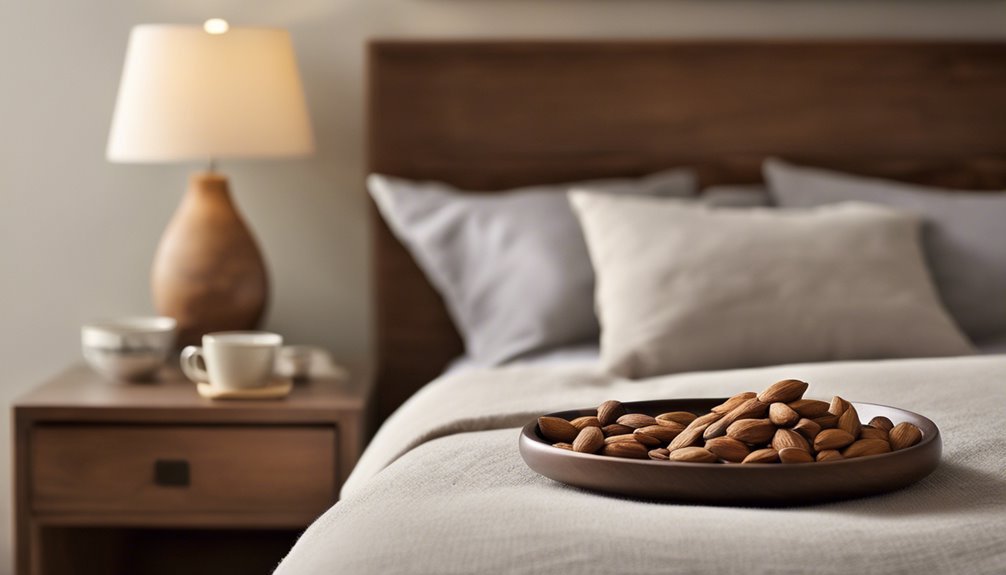
While managing stress is essential for a restful night, choosing the right snacks before bed can also play a significant role in how well you sleep.
It's vital to opt for nutrient-rich options that support your body's natural sleep processes. Foods high in magnesium, like almonds and bananas, or those containing tryptophan, such as turkey or yogurt, can be particularly beneficial. These nutrients help in relaxing your muscles and promoting a sense of calm, guiding you towards a deeper sleep.
However, portion control is equally important. Overeating can lead to discomfort and disturb your sleep, while too little might leave you waking up hungry.
Aim for a small, balanced snack about an hour before bed. This timing allows your body to digest the food properly without impacting your sleep cycle.
Evaluate Your Sleep Position
After considering the ideal bedtime snack, another factor to examine is your sleeping position.
The way you lie down at night can significantly affect the quality of your sleep and overall health. Understanding the sleep position benefits is crucial for maintaining ideal alignment of your spine and reducing the risk of discomfort.
Here are four key sleep positions to consider:
- Back Sleeping: This position is highly recommended for spine health, as it allows your neck, back, and spine to rest in a neutral position. It minimizes pressure points and can help in reducing pain.
- Side Sleeping: Ideal for those with sleep apnea or who are prone to snoring, side sleeping also supports optimal digestive health. Ensure your neck and spine are aligned by using a firm pillow between your knees.
- Fetal Position: While comfortable for many, make sure it's loose, not tight, to avoid restricting deep breathing.
- Stomach Sleeping: Generally not recommended due to the strain it places on your neck and back. If you prefer this position, use a very thin pillow or none at all to keep your neck aligned.
Adopting the right sleep position is essential for a restful night and a pain-free morning.
Consider experimenting with these positions to see which one suits you best, keeping ideal alignment as your guide.
Use Relaxation Techniques
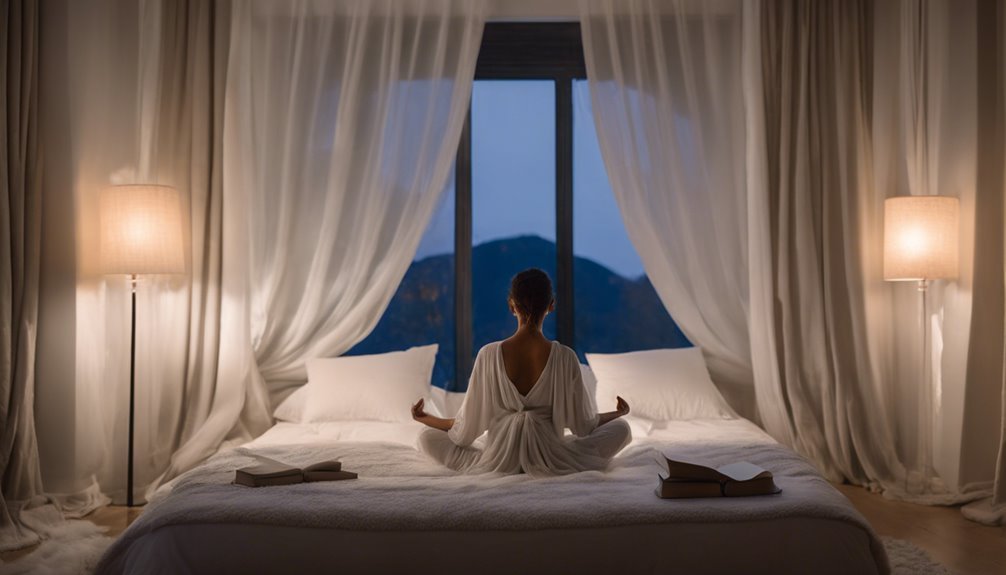
Transitioning from the right sleep position, you can further enhance your sleep quality by integrating relaxation techniques into your bedtime routine. Using methods like deep breathing and guided imagery, you'll not only speed up the process of falling asleep but also improve the depth of your sleep, ensuring you wake up refreshed and ready to serve others more effectively.
Start with deep breathing: Inhale slowly through your nose, allowing your chest and lower belly to rise as you fill your lungs. Hold your breath briefly, then exhale slowly through your mouth or nose, whichever feels more comfortable. This practice helps reduce stress levels by lowering your heart rate and calming your mind, making it easier to fall asleep.
Next, incorporate guided imagery: Picture yourself in a peaceful setting, perhaps a quiet beach or a serene forest. Visualize the details—the sounds, the smells, the scenery. This technique not only distracts from daily worries but also induces a state of relaxation conducive to sleep.
Monitor Your Sleep Patterns
Understanding your sleep patterns is crucial to achieving a restful night's sleep. By monitoring how you sleep, you'll learn more about what helps or hinders your nighttime rest. Utilizing sleep tracking tools can make this task simpler and more effective.
Here are four key ways to monitor your sleep patterns:
- Use Sleep Apps: Download a sleep app that records your sleep duration, quality, and disturbances. Many apps provide insights and tips based on your sleeping trends.
- Keep a Sleep Diary: Note down your bedtime routines, sleep and wake times, and any night-time awakenings. This manual tracking complements the digital insights from sleep apps, offering a comprehensive view of your sleep health.
- Review Sleep Stages: Some advanced sleep apps and wearable devices track your sleep stages — light, deep, and REM sleep. Understanding these patterns helps you identify if you're getting enough restorative sleep.
- Set Goals and Track Progress: Set specific sleep goals such as consistent sleep times and evaluate your progress. Adjust your habits based on the data collected to improve your sleep quality.
Frequently Asked Questions
How Do Allergies Affect Sleep Quality?
Allergies directly impact your sleep by triggering symptoms that increase nighttime discomfort.
You might experience congestion, itchy eyes, or persistent coughs, all of which can disrupt your sleep cycle. The inflammation caused by allergic reactions makes it hard to breathe and remain comfortable throughout the night.
Addressing these symptoms effectively can significantly improve the quality of your sleep, helping you feel more refreshed and capable of serving others effectively during the day.
Can Sleeping Pills Lead to Dependency?
Yes, sleeping pills can lead to dependency, especially if you're using them regularly.
Different types of sleeping pills have varying potential for addiction. Withdrawal symptoms can occur if you stop them abruptly, including insomnia, anxiety, and tremors.
It's crucial to follow your doctor's guidance and use these medications as prescribed.
If you're serving others by offering advice on sleep aids, emphasize the importance of seeking professional advice and exploring non-pharmaceutical sleep support methods.
Are Naps Beneficial for Overall Sleep Health?
Yes, naps can be beneficial for your overall sleep health, especially when timed correctly and kept short.
Aim for a nap duration of 20-30 minutes in the early afternoon to avoid interfering with your nighttime sleep. This strategy helps rejuvenate your mind without causing sleep inertia or impacting your evening restfulness.
How Does Menopause Impact Sleep?
Menopause significantly impacts your sleep due to hormonal changes. You might experience hot flashes and night sweats that disrupt your sleep patterns.
These symptoms occur as your body adjusts to decreased levels of estrogen and progesterone. To manage these effects, consider maintaining a cool sleeping environment and a regular bedtime routine.
Is There an Optimal Sleep Temperature?
Imagine drifting into a serene slumber in a perfectly cooled room.
The optimal sleep temperature for most people falls between 60-67°F (15.5-19.4°C). This range helps your body maintain core temperature regulation, crucial for uninterrupted sleep.
Adjusting your sleep environment to maintain this temperature can significantly enhance the quality of your rest.
Consider investing in a thermostat that adjusts automatically, ensuring you're always enveloped in ideal conditions for rejuvenating sleep.
Conclusion
To ensure a more restful sleep, follow these tips diligently. For instance, Emily, who struggled with insomnia, adopted a consistent sleep schedule and noticed significant improvements within weeks. By also dimming her lights and limiting screen time before bed, she enhanced her sleep quality dramatically. Remember, it's about creating habits that signal to your body it's time to wind down. So, prioritize your sleep environment and routine to transform your nights and energize your days.

